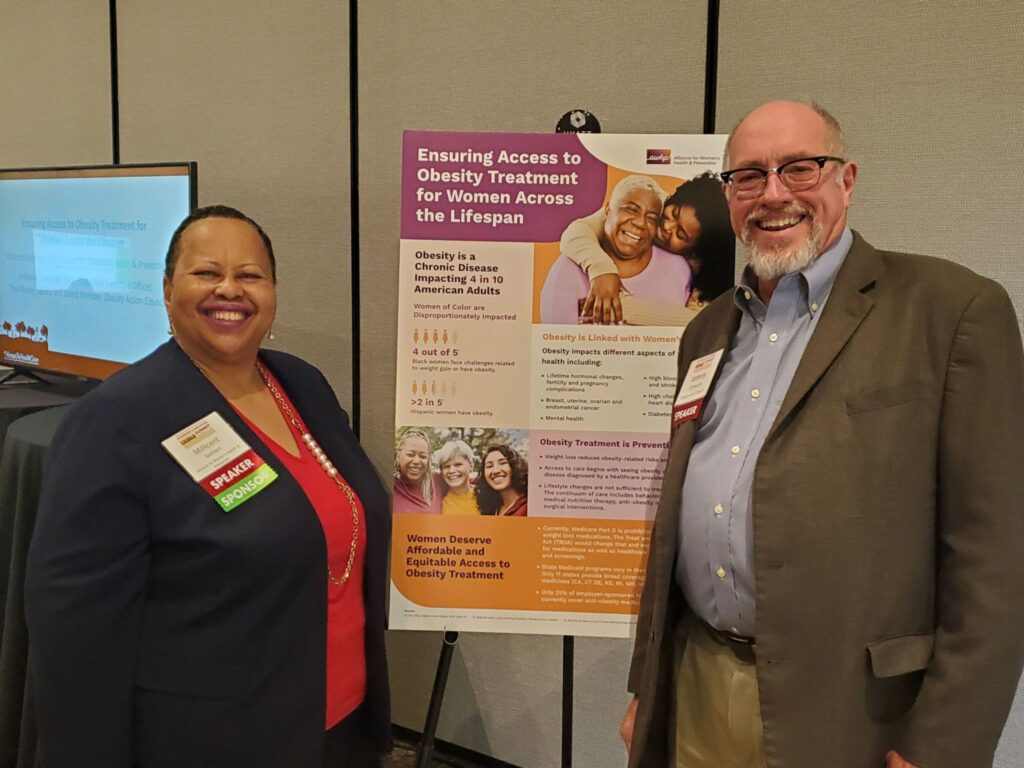In today’s healthcare landscape, few topics garner as much attention and discourse as the pervasive issue of obesity, a chronic disease impacting 4 in 10 American adults, and disproportionately impacting women. Obesity affects multiple aspects of a woman’s health, including hormonal changes, fertility and pregnancy, cardiovascular disease, diabetes, cancer, and mental health.
As an organization focused on women’s preventive health, AWHP recognizes that obesity is a chronic disease and an important part of preventive healthcare – and we believe everybody should have access to the full range of care options, including anti-obesity medications, behavioral therapy, medical nutrition therapy, and surgical interventions. Read on to learn more about the recent actions AWHP has taken around this critical issue.
—
Speaking with Legislators About the Importance of Access to Obesity Treatments for Women
In early November, AWHP’s CEO Millicent Gorham attended the Women in Government 2023 Leadership & Innovation Summit in Texas. Millicent and Dr. Tony Comuzzie, PhD, CEO of The Obesity Society and Board Member of the Obesity Action Coalition, co-led an important conversation with legislators about ensuring equitable access to obesity treatments for women. Currently, insurance coverage of comprehensive obesity treatment varies – across states in Medicaid and across commercial plans offered by employers. Additionally, Medicare Part D is currently prohibited from covering anti-obesity medications. The Treat and Reduce Obesity Act (TROA) would change that and expand Medicare coverage for medications as well as healthcare specialists and screenings.

—
Joining Together to Advocate for Comprehensive Coverage of Obesity Screening & Treatment
AWHP was proud to join over 100 other national and state organizations in signing on to a stakeholder letter in support of TROA, led by the Obesity Care Advocacy Network (OCAN). The letter, sent to the Senate Finance Committee, House Committee on Ways and Means, and Energy and Commerce Committee, aimed to raise awareness of the obesity epidemic and barriers to care, while urging Congress to pass TROA.
Click to read the full letter here.
—
Calling on CMS to Prioritize Obesity as a Key Topic in Future Conferences and Reports About Health Disparities
In October, AWHP sent a letter to the Centers for Medicare and Medicaid Services (CMS) Administrator urging the Centers to include obesity in its health equity work. The letter noted that obesity was noticeably missing from the 2023 CMS Health Equity Conference Report, called on CMS to prioritize the full continuum of obesity care and respectfully urged the Centers to include obesity as a prominent theme in future conferences and reports. Bringing attention to obesity as a chronic disease, its disproportionate impact on women, particularly women of color, and the importance of covering anti-obesity medications is a vital part of improving access to treatment.
—
Hearing from Advocates, Decision-Makers, and Medical Experts about Challenges in Obesity Care
AWHP’s CEO Millicent Gorham recently attended a roundtable co-hosted by the Obesity Action Coalition, American Diabetes Association, and Obesity Care Advocacy Network. The roundtable hosted panels on “Obesity Care Lessons Learned & Opportunities to Tackle Disparities,” “Congressional Perspectives on Addressing the Obesity Treatment Gap,” and “Opportunities to Improve Obesity Care & Innovation,” featuring speakers from Congress, CMS, CDC, U.S. Office of Personnel Management (OPM), and Veterans Health Administration (VHA), as well as patient advocates.
Last week, AWHP was honored to serve as an in-kind sponsor of a virtual congressional briefing hosted by the American Medical Women’s Association (AMWA). Titled, The Heart of It All: Impact of Obesity on Cardiometabolic Health, the briefing featured experts discussing the medical impact of obesity and opportunities for intervention. Without effective management, associated medical costs for obesity-related conditions including heart disease, hypertension, elevated lipids, diabetes, sleep apnea, orthopedic conditions, and some cancers, will continue to rise.
